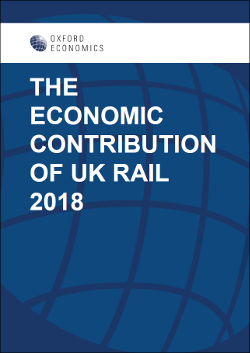Ungated Post | 26 Feb 2018
The economic impact of UK rail 2018

This major Oxford Economics study for the Railway Industry Association investigates the support provided to UK GDP, jobs, and taxes by the country’s rail-related industries. The industries covered include the railway network itself, the whole of the UK-based supply chain for that railway system and for railway systems overseas, retailers and caterers operating at railway stations, and the supply chain for those retail outlets. Activity ‘induced’ by the wage-funded spending of staff working in these industries is also included. Taking all of these activites together, some £36 billion of GDP was supported in 2016 – equivalent to 2.3 percent of the UK economy. This was sufficient to support almost 600,000 jobs – 1.7 perecent of national employment – and to generate £11 billion in tax revenues. The figures include the impact of railway construction activity as well as ‘day-to-day’ supplies of goods and services, and take in London Underground and other local networks in addition to the ‘mainline’ system.
Oxford Economics’ team is expert at applying advanced economic tools that provide valuable insights into today’s most pressing business, financial, and policy issues.
To find out more about our capabilities, contact:
Americas
Diantha Redd
+1 (646) 503 3052
Email
Asia Pacific
Peter Suomi
+65 6850 0110
Email
EMEA
Aoife Pearson
+44 (0)203 910 8054
Email
Related Services

Post
KPMG M&A Outlook 2026: Between Uncertainty, Resilience, and Seizing Opportunities
Discover how Germany’s M&A landscape is evolving – with a focus on growth, AI and post-merger value creation.
Find Out More
Post
Silver, the next generation metal
This report highlights the critical role silver plays in data centres and artificial intelligence (AI), automotive and electric vehicles (EVs), and solar energy photovoltaics (PVs). With these sectors expected to expand significantly over the coming years, we expect future silver demand to be strong.
Find Out More
Post
Powering the UK Data Boom: The Nuclear Solution to the UK’s Data Centre Energy Crunch
The UK’s data centre sector is expanding rapidly as digitalisation, cloud computing, and artificial intelligence (AI) drive surging demand for high-performance computing infrastructure.
Find Out More